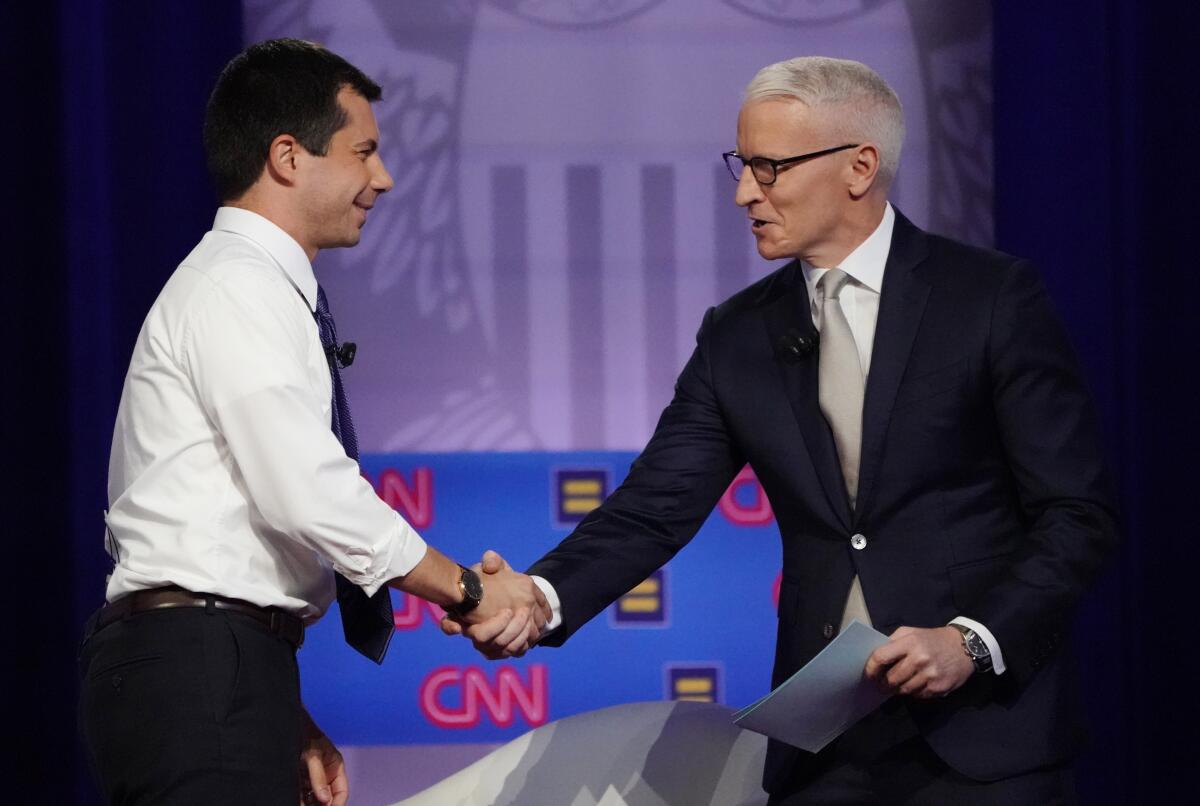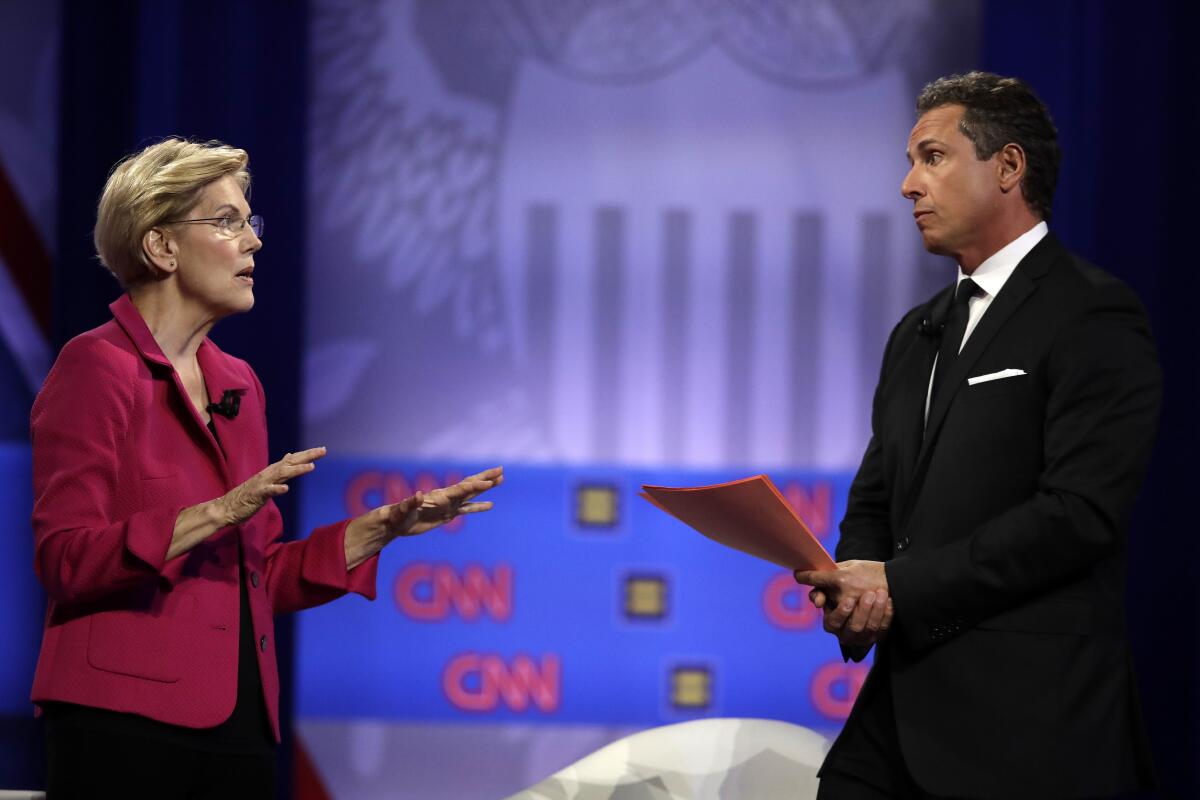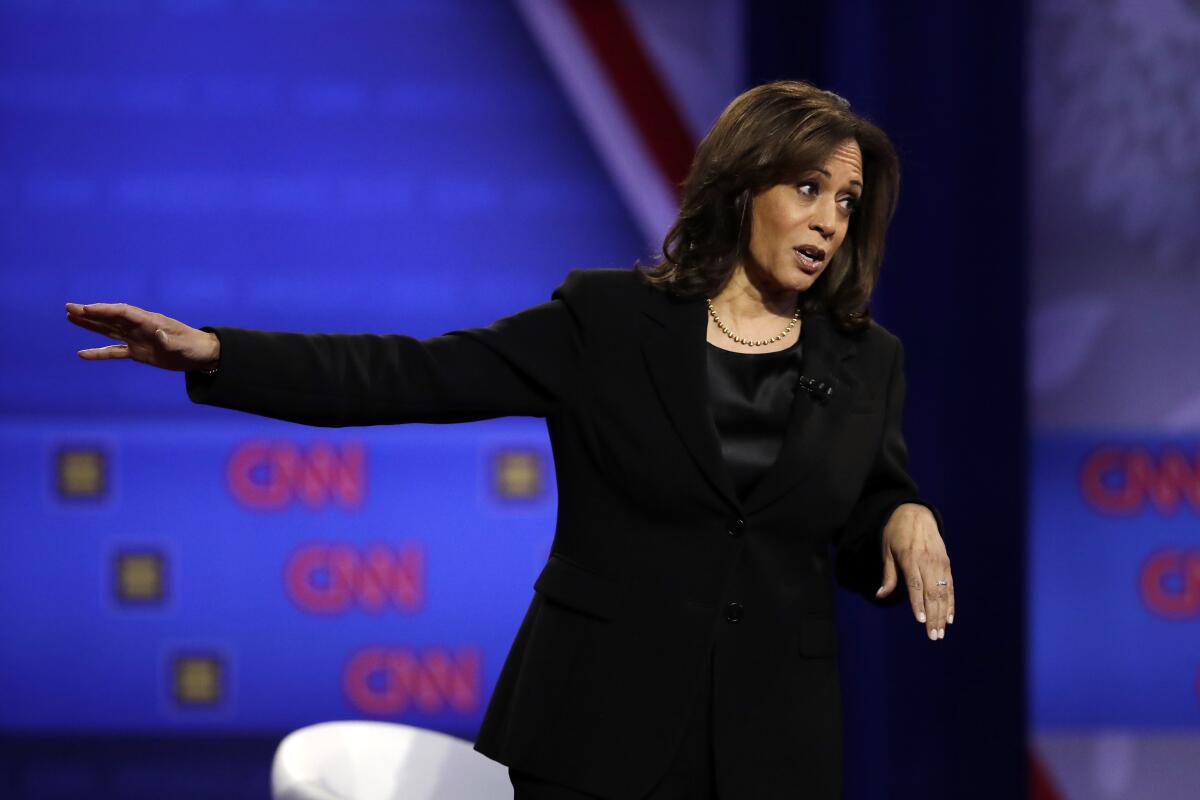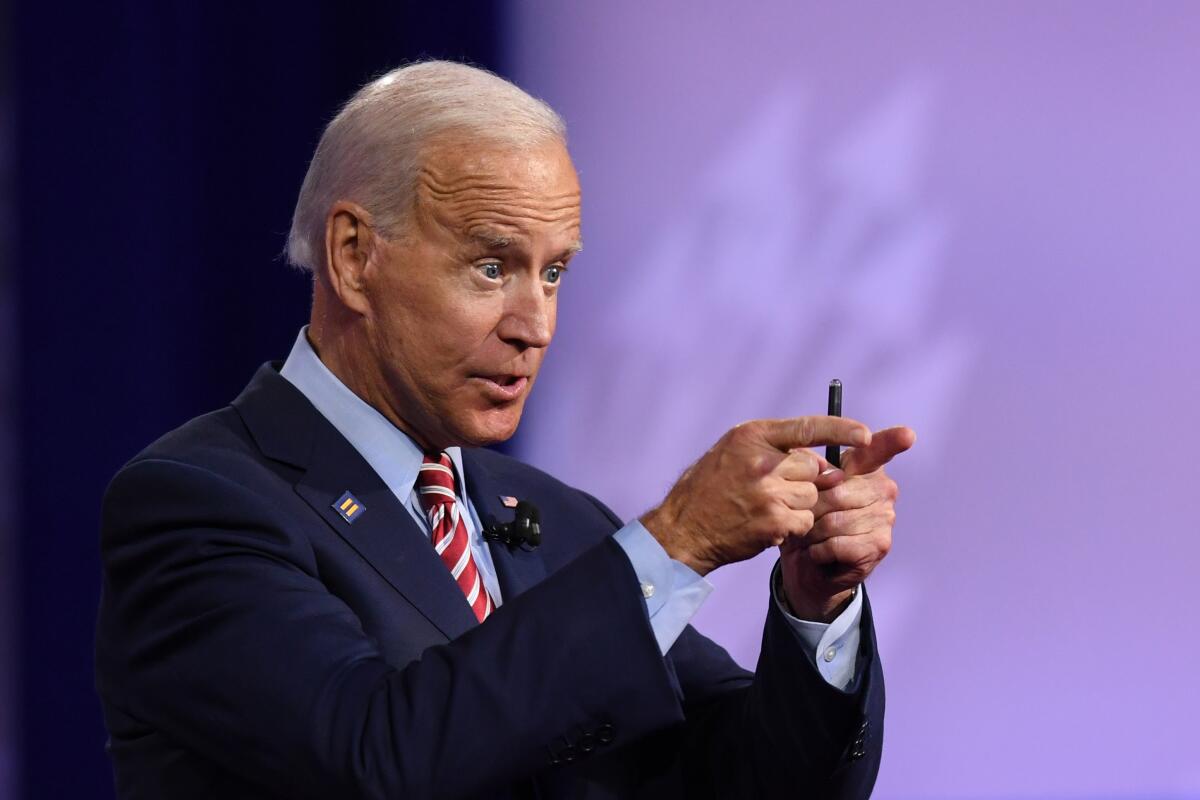‘Thou shalt not serve the gays meatloaf’? Democrats disagree

Andrew Beaudoin of Jacksonville, Fla., wanted to know what Pete Buttigieg, a gay Episcopalian, thinks of restaurants using “religious liberty” as a reason to deny service to LGBTQ people and whether he knew of “any teachings in faith which state things like ‘thou shalt not serve the gays meatloaf.’”
“When religion is used in that way, to me, it makes God smaller,” the Democratic presidential candidate and mayor of South Bend, Ind., responded. “It, to me, is an insult not only to us as LGBTQ people, but I think it’s an insult to faith to believe that it could be used to hurt people in that way.”
He went on to say that his love and commitment to his husband, Chasten Buttigieg, had moved him “closer to God.”
The exchange was part of a sweeping exploration of LGBTQ politics over 4 1/2 hours Thursday on CNN. In back-to-back appearances at a televised forum in Los Angeles, Buttigieg and eight other Democrats running for president sketched out similar agendas on LGBTQ issues.
They each vowed to reverse President Trump’s rollbacks of LGBTQ rights, promising to reverse his ban on transgender people serving in the military and to outlaw discrimination on the basis of sexual orientation or gender identity.
Buttigieg got the warmest reception of the candidates. He spoke about his decision to publicly come out as gay soon after returning from war.
In criticizing the ban on transgender troops, the 37-year-old U.S. Navy Reserve veteran who served in Afghanistan took a swipe at the president for getting a medical deferral to avoid service in the Vietnam War.
“The transgender military ban is an outrage against the willingness of service members to put their lives on the line for this country, and they are having their careers threatened by a president who avoided serving when it was his turn,” he said to a burst of applause. “That is dead wrong.”
The forum, sponsored by the Human Rights Campaign Foundation, came as public support for LGBTQ rights has been rising. Large majorities of Americans back same-sex marriage and oppose the ban on transgender people in the military.
Trump promised during his 2016 campaign to be a friend to LGBTQ Americans, but as president has sought on multiple fronts to roll back their rights. His administration argued before the U.S. Supreme Court on Tuesday that the Civil Rights Act of 1964 does not bar employers from firing workers based on their sexual orientation or gender identity.

At the CNN forum, several candidates were interrupted by hecklers trying to call attention to the slayings of at least 18 black transgender women this year. Anderson Cooper, one of the moderators, said they were “absolutely right to be angry and upset at the lack of attention, particularly in the media.”
“Let me just point out there is a long and proud tradition and history in the gay, lesbian and transgender community of protest, and we applaud them for their protest,” said Cooper, who is gay.
One person shouted to Kamala Harris that transgender women of color were being “hunted systematically.”
“You’re right,” the senator responded and promised “serious accountability.” She added, “I hear you.”
A black transgender woman who identified herself as Blossom C. Brown grabbed one of the audience microphones when former Rep. Beto O’Rourke of Texas was on stage. “Black trans women are dying!” she shouted. “Our lives matter!”
CNN anchor Don Lemon allowed her to speak for a bit, telling her, “The reason we are here is to validate people like you.”
In the hours before the town hall, three of the candidates — Harris, Buttigieg and Massachusetts Sen. Elizabeth Warren — released plans to strengthen LGBTQ rights in largely similar ways. O’Rourke had put out his LGBTQ agenda in June. All four vowed to reverse the transgender military ban and to work to explicitly outlaw discrimination on the basis of sexual orientation or gender identity.
Warren promised to “use every legal tool we have” in her first 100 days as president to restore nondiscrimination protections that were put in place by President Obama and rescinded by Trump, including an executive order barring federal contractors from discriminating against LGBTQ workers.

Harris pledged to fight for her proposed law to ensure that religious freedom can’t be used to justify discrimination, a bill that Warren also vowed to sign into law. Harris said she would also put a chief advocate for LGBTQ affairs on her White House staff.
All four of the candidates’ plans include promises to expand access to the PrEP HIV-prevention drug. Buttigieg has set a goal of ending the HIV epidemic by 2030.
He also proposed outlawing “conversion therapy,” which purports to make people heterosexual, and forming a task force aimed at preventing LGBTQ suicides. Other candidates also vowed to take action against conversion therapy.
“In my opinion this is tantamount to torture — torture that we’re visiting on children who are absolutely defenseless,” O’Rourke told the audience at the Novo theater at L.A. Live.
Harris reminded the audience that when she was California attorney general, she fought to overturn Proposition 8, the 2008 ballot measure that banned same-sex marriage, saying it was time for the United States to ban discrimination against LGBTQ Americans.
“We did it before,” she said. “As president, I will do it again.”

Former Vice President Joe Biden said part of the trouble in getting the anti-discrimination law passed is that many Americans don’t realize it’s legal in much of the country to fire someone for being part of the LGBTQ community.
“When we talk about being able to get married on Sunday and get, or Saturday, and get fired on Monday, the vast majority of American people don’t think that’s possible,” said Biden, who promised to open “a special office that’s devoted directly to promoting LGBTQ rights around the world.”
Warren acknowledged the anti-discrimination bill would face grim prospects in Congress if Republicans maintain their majority in the Senate. It passed the Democratic-controlled House in May.
“What it’s going to take in the Senate, I’m just going to be blunt: We’ve got to have more Democrats in the Senate,” Warren said.
She turned cheeky when asked how she’d respond to someone who says marriage should be restricted to one man and one woman.
“I’m going to assume it’s a guy who said that,” she said. “And I’m going to say, ‘Then just marry one woman. I’m cool with that. Assuming you can find one.’”
Warren also voiced regret for criticizing a judge during her 2012 Senate race for a ruling that granted transition-related surgery to a transgender inmate. “I think it was a bad answer,” she said.
Another top contender for the nomination, Vermont Sen. Bernie Sanders, declined to travel to Los Angeles for the town hall while recovering from the heart attack he suffered last week, but issued a statement saying the nation “must not let Donald Trump and the Supreme Court take us backwards.”
More to Read
Get the L.A. Times Politics newsletter
Deeply reported insights into legislation, politics and policy from Sacramento, Washington and beyond. In your inbox three times per week.
You may occasionally receive promotional content from the Los Angeles Times.











